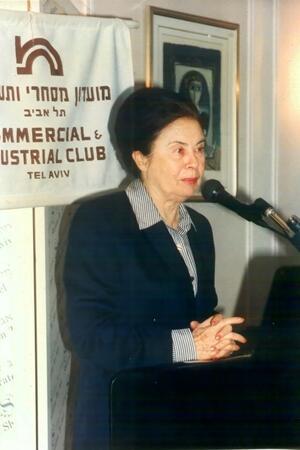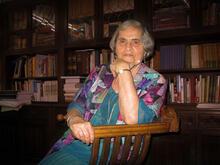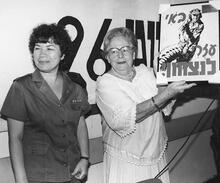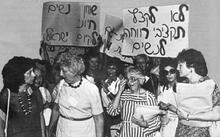Ora Namir
Ora Namir was an Israeli politician, diplomat, and “dove” whose efforts on behalf of women’s rights and social justice are enjoyed today by all Israeli citizens. She was General Secretary of the Tel-Aviv-Jaffa branch of Na'amat (Working Women and Volunteers Organization), 1967-79; Labor Party member of Knesset, 1974-1996; and Minister of the Environment and Minister of Labor and Social Welfare during the 1990s. Namir headed a commission of enquiry into the status of women in Israel, which in its report exposed the truth behind the myth of Israel as an egalitarian country and presented one hundred and forty recommendations for change. Namir initiated and/or helped to ensure the passage of several laws related to women’s status and welfare. She served as Israel’s ambassador to China and non-resident ambassador to Mongolia, 1996-2000.
Family and Education
One of Israel’s outstanding advocates and legislators in the field of social justice in general and women’s rights in particular, Ora (née Toib) Namir was the only child of pioneering agricultural laborers in the moshav of Hoglah in the central Sharon region of Israel (founded in 1933). Her father, Pinhas Toib (c. 1900–83), immigrated to Palestine in 1925 from Kovel, Ukraine, where who had studied both in a Lit. "room." Old-style Jewish elementary school.heder and at a Tarbut gymnasia. He married Miriam Trachtenberg (c. 1900–1990), who had immigrated from Zhytomyr (Ukraine) the same year. They moved to Kefar Hoglah in 1936.
Namir was born in Hadera on September 1, 1930. Her formal education was frequently interrupted. Her troubled and frequently disrupted childhood may have been a factor in prompting her later unswerving interest in social justice and her devotion to public service. After attending the first eight grades of elementary school in Kefar Hoglah, she studied for one year at A voluntary collective community, mainly agricultural, in which there is no private wealth and which is responsible for all the needs of its members and their families.Kibbutz Givat Hayyim, where “outsiders” were not welcomed, and then spent an unhappy year at the Lewinsky Training Seminary for Women Teachers, where she found the large classes, unsympathetic staff, and formal atmosphere uncongenial. Transferring once more, this time to Givat ha-Sheloshah, which she liked, she encountered a further cause for interruption when the War of Independence broke out in 1948. She served with the 7th Brigade, later becoming an officer in the newly formed Women’s Corps.
Early Public Service
In 1953, Namir married Moshe Lipson (Nachshon) and moved with him to Tel-Aviv, where she worked as a clerk in the Information Department of the ruling party, Mapai. Later, Mapai Secretary General and Minister Zalman Aran appointed her secretary to the party’s parliamentary faction and to the Coalition Administration in the second Lit. "assembly." The 120-member parliament of the State of Israel.Knesset.
Between 1954 and 1957, Namir served as Secretary General of the Consul General's Office at the Israeli Consulate and of the Israeli delegation to the United Nations in New York. She taught Hebrew to Avraham Harman, the Consul General. In New York she was able to fulfill her ambition to attend courses in English literature and Greek and Roman culture at Hunter College. However, lack of funds and a severe injury incurred during a compulsory physical education class compelled her to abandon her studies and return to Israel.
When she returned to Israel, Namir was appointed secretary of the "Exhibition of the Decade"—an art exhibition marking the tenth anniversary of the establishment of the State of Israel. She was then appointed director of the office responsible for the construction of the Knesset building in Givat Ram.
In 1959, Ora, who had divorced Moshe Lipson, married Mordechai Namir (1897–1975), the new mayor of Tel-Aviv (1959-1969) and Member of Knesset (1951-1969). A widower, he was 33 years her senior.
Ora Namir began to take an active interest in matters relating to young people. In June 1967, she was elected Secretary-General of the Tel-Aviv-Jaffa branch of Na'amat (Working Women and Volunteers Organization), a post she held until 1979.
Member of Knesset and Minister
Elected to the Eighth Knesset in 1973 as a member of the Ma’arakh (Labor Alignment), Namir began a long and distinguished career as a legislator, which continued until the Thirteenth Knesset (1992–May 21, 1996). During her 22 years as member of the Knesset, she was first briefly Minister for the Environment (July 7- December 31, 1992) and subsequently Minister of Labor and Social Welfare (December 31, 1992 - May 21, 1996).
Namir served as a member of the Committees on Education and Culture (1974-1977), Public Services (1974-1977), and Public Audit (Control) (1977-1981), as well as chairing the Committees on Education and Culture (1977-1984) and Labor and Social Welfare (1984-1992).
In 1975, the UN International Year of the Woman, Namir’s prior experience in an organization that dealt primarily with the status and welfare of working women led the prime minister, Yitzhak Rabin, to invite her to head a commission of enquiry into the status of women in Israel—an issue that had been unexpectedly highlighted by the experience of the 1973 Yom Kippur War. For the first time in the (albeit short) history of the state, people were made aware of the extent to which women had been relegated to inferior, lower-paid positions, employed primarily in the service professions, and excluded from vital decision-making and determination of public policy. The commission, which Namir headed with great skill, was comprised of almost one hundred (women) legislators and members of the general public, most of them women, who had first-hand knowledge of one or more areas of public and professional life. Working in a purely voluntary capacity under the excellent co-ordinator, Ora Ahimeir, they collected and collated hitherto unknown data on women in Israel, which were summarized in a two-volume report that not only exposed the truth behind the myth of Israel as an egalitarian country, but also presented one hundred and forty recommendations for change. For the majority of the commission members, including Namir herself, the two years of activity proved an eye-opening experience.
The combined findings of the “Namir Report” brought to light that although Israeli women had been given the vote even before the establishment of the state, and there had been women in every Knesset, women were still treated as inferior in what was essentially a patriarchal society. Based on the findings of her team, Namir made several recommendations, including: establishing a national authority to monitor the status of women; enacting the Equal Opportunities at Work Law (now a cornerstone of employment law in Israel); guaranteeing 30 slots for women in the 120-member Knesset; opening all Israel Defense Forces ranks and non-combat roles to women; establishing special grants for single mothers, and compulsory and free education for children from the age of three onward.
Although too little government action followed (in part because the prime minister to whom the commission reported was Menahem Begin, not Rabin), the Namir Commission can with full justification be seen as the catalyst for later feminist advocacy and activity, including the 1984 founding of the Israel Women’s Network, many of whose members had served on the commission.
Namir herself initiated and/or helped to ensure the passage of several laws related to women’s status and welfare. These included the Equal Retirement Age of Men and Women (1987), the Equal Opportunities in Employment Act (1988), the Single-Parent Families Law (1992), the Blind People’s Rights Law (1993), and the Equal Pay for Men and Women Workers Act (1996). Equally concerned with the rights of the economically and socially disadvantaged sectors of the population, Namir was largely responsible for the passage of the Minimum Wage Law (1987) and rights for demobilized soldiers along with regulations that improved the status of subcontracted workers and enhanced unemployment benefits. She ardently and successfully advocated the National Insurance Institute as the major tool of Israel’s social welfare system.
In 1995, Namir headed the Israeli delegation to the UN Conference on Women, held in Beijing.
Ambassador to China and Non-Resident Ambassador to Mongolia
In the run-up to the Knesset elections of 1992, although Namir came last in the leadership Labor Party contest, her popularity soared and she was placed fifth on the party list, the party's top woman. In May 1996, after successfully overcoming a serious illness and unsuccessfully competing for the position of Chairperson of the Labor Party following the assassination of her mentor Yitzhak Rabin, she took up a new career as a diplomat: she was appointed Israel’s ambassador to China and non-resident ambassador to Mongolia. In this new role, she displayed her customary energy, diligence, and skill. Traveling tirelessly throughout the vast country, she achieved unmediated contact with citizens of all types and professions. She frequently hosted members of the Chinese government and provincial governors, at the same time ensuring that they met representatives of various sectors in Israel—agriculturists, industrialists, economists, scientists, and academics—thus facilitating ongoing collaboration of various kinds. A member of the Israeli delegation testified that the Chinese guests were often amazed by the amount and precision of her knowledge of their country and its people, as well as her ability to understand the many problems they faced. In 1998, on Israel’s fiftieth anniversary, Ariel Sharon, in his capacity as Minister of National Infrastructure, was the first Israeli minister to visit the capital of Mongolia. Later he wrote to Namir, warmly congratulating her on her “organization and production” of the celebration, which he described as contributing greatly to ensuring Israel’s presence on the “map of awareness” of Mongolia’s leaders.
Namir was very successful in her job, and as a token of appreciation she was named by the Chinese a distinguished citizen of the city of Beijing and was invited to attend the opening ceremony of the Beijing 2008 Olympic Games.
Namir completed her term of office in 2000 and returned to Tel-Aviv. She ran in the 2003 Knesset elections as a member of the One Nation Party but did not win a seat.
At one stage in the mid 1990s, it was feared that Namir might die. A cancerous tumor was discovered in her brain, but doctors operated successfully, and she recovered relatively quickly.
Namir became known as the “First Lady” of the Labor Party following the death of former prime minister Golda Meir, but whereas Meir had been no fashion plate, Namir was always elegantly dressed and sported the same beehive hairstyle for most of her life.
Acknowledged by both her political colleagues and members of opposition parties as honest, hardworking, and courageous, Namir undoubtedly emerged, together with her political rival, Shulamit Aloni, as among the outstanding women politicians after Golda Meir, in advancing the status of Israel’s women.
Namir died at her home in Tel-Aviv on July 7, 2019.






